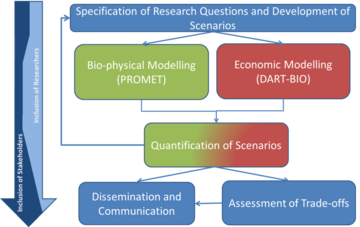BioNex – The future of the biomass nexus
Start of Project: 01.04.2017 — End of Project: 31.03.2020
Through the National Policy Strategy Bioeconomy, the German government pursues the transformation to a bio-based economy, in which fossil resources are replaced with biomass. The challenge for this transformation is the simultaneous achievement of sustainable use of natural resources, global food security and economic growth. The BioNex research project seeks to generate solution oriented knowledge that supports the transformation towards a sustainable bioeconomy through identifying and quantifying trade-offs between alternative uses of biomass. Our aim is to integrate stakeholder know-how in an interdisciplinary model-based analysis to depict the relevant systemic interconnections in the bioeconomy (see figure 1). To this end, we develop research questions and plausible scenarios for the target year 2030 in co-design together with stakeholders. Among other issues, we will explore which bioeconomy activities will experience significant growth in the coming years and are likely to affect global markets as well as the impact of climate change on agricultural productivity and potential feedback effects on regional and global agricultural markets.
To simulate and evaluate these scenarios, we will use an integrated modeling framework consisting of the global economic model DART-BIO and the bio-physical plant growth model PROMET. Following our scenario analysis, we will identify and quantify potential trade-offs between alternative uses of biomass together with stakeholders in “co-production”. This also includes assessing the impact of policy measures that shape the transformation process towards a bio-based economy as well as feedback effects on global markets. Central to this evaluation will be the analysis of tradeoffs between different land use options as land is the limiting resource base for biomass production (biomass nexus). In addition, we will explore the impact of national bioeconomy support measures.
Partner: Ludwig-Maximilians-Universität München
Project Management: Kiel Institute for the World Economy
Dynamic Applied Regional Trade (DART) Model
The model version "DART-BIO" is currently used within the BioNex project.



